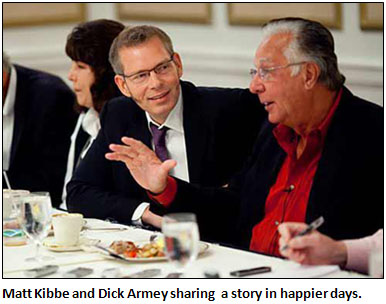Andrew Sullivan links today to a short piece by Tim Parks in the New York Review of Books about the process of Americanizing a book that “explores the Italian national character through an account of thirty years’ commuting and traveling on the  country’s rail network.” He was frustrated by the extent of the copy editing, and after negotiating some changes he wondered what was really going on:
country’s rail network.” He was frustrated by the extent of the copy editing, and after negotiating some changes he wondered what was really going on:
Looking at this re-edit one realizes that the notion of Americanizing a text actually opens the way for a copy editor to impose personal preferences, perhaps imagining that something that sounds odd to his ear is un-American rather than simply my way of writing or his way of reading. Does anybody in the end really know with absolute certainty, all the differences between American and English usages? Aren’t there a wide range of usages in both these countries? How can I know, when I see a particular edit, if it is an Americanism I have to accept, or a matter of individual taste I can take issue with?
Yep. Back in my marketing days I dealt frequently with European distributors, and I learned that whenever they disliked some policy of ours they’d insist that “cultural differences” were at issue. But this was often just an all-purpose excuse that they hoped I couldn’t argue with. In reality, our differences were most often just the usual ones between a supplier and a distributor.
But of course, you had to be careful. Sometimes there really were cultural differences at work, and you had to be willing to dig deeply enough to figure which was which. Take this complaint, for example:
In my train book, for example, after a few pages discussing the fate of Italian railways under Nazi occupation, I begin a new paragraph “2,104 railwaymen died in the war” and find this changed to “A total of 2,104 railwaymen died in the Second World War.” What is the sense of “A total of”? Surely it’s not a requirement of Americanization. What does it add? The idea of my counting up the dead? To my ear the bare number has exactly the brutal eloquence that such statements demand. And how could the reader get his war wrong when we’d just been talking Mussolini and Hitler? When I cut “A total of” I find the sentence reappearing in the proofs thus: “In the Second World War, 2,104 railwaymen died…” One hardly needs to go to a creative writing class to appreciate that this formulation has less rhetorical force than “2,104 railwaymen died in the Second World War.”
Apparently nobody told Parks why they were doing this. It’s simple: if you open a sentence with a number, you’re supposed to spell it out. But long numbers are cumbersome to spell out, so normally editors try to recast the sentence instead. This isn’t an Americanism at all.
Or is it? It’s definitely not house style. I’ve never worked with an editor anywhere who wouldn’t follow this rule. But I’ve never worked with a non-American editor. So I wonder: Is this really a rule that’s common in America but unheard of anywhere else? Would any of my overseas readers care to chime in on this?
POSTSCRIPT: For the record, I’ve always thought this was a dumb rule. Sure, spell out small numbers at the start of a sentence. No problem. But big numbers? Just leave them in. What on earth is supposed to be so off-putting about it?
I once read a sentence that began like this: “Nineteen sixty-eight was a year of….” Dumb! Off-putting! Did the copy editor who did that really think that any readers would be confused by a sentence that started with 1968?
 to Hagel, just as I was to the smears against Rice. This makes me a Hagel fan despite myself.
to Hagel, just as I was to the smears against Rice. This makes me a Hagel fan despite myself.
 issues that Armey called
issues that Armey called 

 country’s rail network.” He was frustrated by the extent of the copy editing, and after negotiating some changes he wondered
country’s rail network.” He was frustrated by the extent of the copy editing, and after negotiating some changes he wondered 
 similar reasons, Republicans routinely attack the CBO, the Joint Committee on Taxation, the Government Accountability Office, and, most famously, the BLS when it reported a drop in the unemployment rate just before this year’s election.
similar reasons, Republicans routinely attack the CBO, the Joint Committee on Taxation, the Government Accountability Office, and, most famously, the BLS when it reported a drop in the unemployment rate just before this year’s election.


